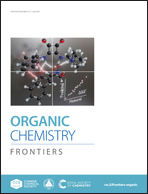Rhodium(i)/bisoxazolinephosphine-catalyzed regio- and enantioselective amination of allylic carbonates: a computational study†
Abstract
Density functional theory calculations have been performed to investigate the rhodium(I)/bisoxazolinephosphine-catalyzed amination of allylic carbonates. The computations reveal that after formation of the η3-allyl Rh(III) species via initial C–O oxidative addition, the ensuing C–N bond formation via outer-sphere nucleophilic attack represents the step that determines the regio- and enantioselectivities of the overall reaction. It was found that in the nucleophilic attack transition states, the allyl ligand adopts an η2 coordination mode. As a consequence, both steric and electronic effects favor the branched transition states over the linear transition states, thus enabling the experimentally observed exclusive branched selectivity. The excellent enantioselectivity was rationalized on the basis of the steric repulsion between the allyl moiety and the isopropyl group at the right oxazoline ring of the bisoxazolinephosphine ligand.



 Please wait while we load your content...
Please wait while we load your content...